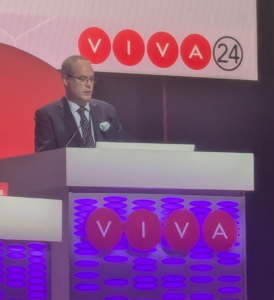
Endologix has announced the final 36-month results from the DETOUR2 study—a prospective, single-arm, international, multicentre clinical evaluation of the novel Detour system for fully percutaneous femoropopliteal bypass procedures.
A press release details that the findings highlight the durable efficacy of the Detour system, which is comparable to open bypass with a synthetic graft. Additionally, the low rates of complications and deep vein thrombosis (DVT) demonstrate the favourable safety profile of this novel technique.
Endologix notes that the Detour system offers a unique approach to treating complex peripheral arterial disease (PAD), enabling physicians to percutaneously bypass lesions in the superficial femoral artery, by using stents routed through the femoral vein to restore blood flow to the leg. The Detour system is comprised of the Endocross device and Torus stent grafts.
The 36-month results from the study were presented during a late-breaking clinical trials session at VIVA 2024 (3–6 November, Las Vegas, USA) by one of the study’s principal investigators, Sean Lyden (Cleveland Clinic, Cleveland, USA). “These extended results from the DETOUR2 study help continue to demonstrate using the Detour system is comparable to surgical bypass but without requiring general anaesthesia, which can come with additional complications and longer length of stay,” said Lyden.
“The 36-month data from the DETOUR2 study underscore the potential of the Detour system to significantly impact the treatment paradigm for long segment SFA disease,” said Matt Thompson, president and chief executive officer of Endologix. “We are confident in the Detour system’s ability to offer a less invasive, effective alternative for patients with challenging femoropopliteal lesions. As we move forward, our focus remains on ensuring optimal patient outcomes through rigorous training, ongoing data collection, and the PTAB-1 postmarket study to further validate these results in real-world settings.”
The DETOUR2 study enrolled 202 patients at 32 sites, and 200 patients were treated with the Detour system. The mean lesion length was 32.7cm, 96% were chronic total occlusions (CTO), and 70% were severely calcified.
The results presented highlight:
- Freedom from clinically driven target lesion revascularisation was 66.8% through three years.
- Primary patency was 58.2% through 36 months.
- Clinical success, defined as improvement in at least one Rutherford category at 36 months, was 96.7%.
- Freedom from symptomatic DVT was 95.9% at 36 months.
- Freedom from major lower limb amputation was 98.5% at 36 months.
- Average length of hospital stay was 1.1 days.












